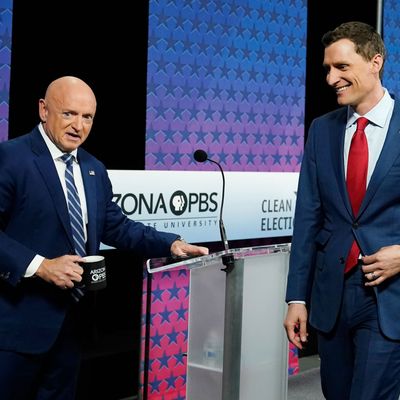
One of the big media narratives of the latter stages of the midterm election cycle is that some MAGA candidates who said outlandish thing to win Republican nominations are struggling to moderate their images to appeal to general-election swing voters. Exhibit one in this exercise has been Arizona Senate candidate Blake Masters, who established himself as quite the extremist figure in winning his primary with financing from his outlandish boss and mentor, Peter Thiel, and validation from Donald J. Trump. Here was how I described Masters right after Trump endorsed him:
Masters is arguably the real deal in terms of being the edgiest “national conservative” or “right-wing populist” or whatever you choose to call the toxic politics he shares with [J.D.]Vance, [Tucker] Carlson, Josh Hawley, Steve Bannon, Donald Trump Jr., and other MAGA demagogues. … Masters favors a national abortion ban, close to a complete immigration ban, a ban on teachers unions, and harsh anti-crime policies. He has opposed aid to Ukraine. But what clearly attracted Trump to his banner was Masters’s staunch support for his 2020 election fables in a state that actually undertook a post-election “audit” (to the great hilarity of non-MAGA observers everywhere). Masters resolutely maintains that Trump won the presidency and lost it by foul means.
That was then. Now Masters is attempting something of a makeover. It began when he scrubbed his campaign website to delete support for fetal personhood and instead simply support a ban on rare third-trimester abortions. And in his sole debate with centrist incumbent Democrat Mark Kelly, he performed an equally sneaky repositioning on what happened in the 2020 election, as the conservative Washington Examiner reported:
When pressed about the legitimacy of the 2020 election, which former President Donald Trump claimed was stolen from him, Masters first responded that Biden was “duly sworn and certified.”
“I’m not trying to trick you. He’s duly sworn and certified. He’s the legitimate president,” he said. “He’s in the White House, unfortunately for all of us.”
He continued, “Was [the election] rigged in any way, shape, or form enough to keep Donald Trump out of the White House? I suspect that if the FBI didn’t work with Big Tech and big media to censor the Hunter Biden info or the Hunter Biden crime story? Yeah, I suspect that changed a lot of people’s votes,” but he specified that he hasn’t seen any evidence of voter fraud similar to Trump’s claims.
That contradicts his earlier support for the full MAGA set of 2020 conspiracy theories, which are particularly luxuriant in Arizona.
But the concession of Biden’s legitimacy makes Masters sound reasonable, right? Well, not so much if you think about what he’s still saying about 2020. For one thing, he’s blowing a loud dog whistle to MAGA election conspiracists by making a big deal out of the Hunter Biden “story.” And he didn’t just do it in response to the “stolen election” question, either, as Amanda Carpenter quickly noted:
Whenever Kelly tried to make a point about the upcoming elections and democracy, Masters steered the conversation to how the FBI supposedly suppressed information in some deep-state conspiracy to elect President Joe Biden. It was as if Masters were speaking another language. … Throughout the debate, Masters dropped other references to Hunter Biden, the FBI, Big Tech, and Big Media. But none of them was really relevant to the questions being asked. Kelly didn’t have much to say in return. Probably because he couldn’t follow what Masters was saying. Only those fully steeped in the argot of MAGA could really follow.
And worse yet, even if you understand and give legitimacy to the stuff way down the rabbit hole about Hunter Biden and his laptop and the alleged plot to keep it all under wraps, is it really likely the bizarre, technical, and very convoluted “story” would have changed the election results had it been more broadly reported? No. But here’s the point: It’s impossible to prove it.
In a close election, you can obviously claim all sorts of counterfactuals that might have moved votes in one direction or the other. What if some of the details we now know about the chaotic mess that was the Trump White House had been broadly known? Would some of the voters who supported him just because they liked the economic numbers that accompanied his presidency have given it a second thought? Maybe. We don’t know. Just as we don’t know whether a better understanding of the fully formed intentions of Trump’s Supreme Court nominees to abolish abortion rights (and you cannot tell me with a straight face they were in any doubt about it after Amy Coney Barrett joined the Court) might have flipped some votes to Biden as well.
Blake Masters is essentially espousing a “butterfly effect” theory of election outcomes. And it is in some respects more insidious than concrete, verifiable claims of election malfeasance (e.g., hacked voting machines, forged mail ballots, non-citizens voting, etc.). If you think the FBI, “big media” and “Big Tech” are evil but powerful institutions that can inject or withhold enough public information to change election results, then you are likely to think it happens all the time, as I noted recently in a typology of Election Denial:
The most terrifying aspect of the delegitimization of the last presidential election is that it is an evergreen precedent: Its claims can and probably will be made before and after every election won by the “wrong” party. Some critics of the endless relitigation of 2020 urge the election-deniers to look forward rather than backward. The bad news is that they probably are.
Election Denial Lite, as Masters pursues it, may sound less extreme than crazy stuff about Venezuelans rigging voting machines. But it’s a recipe for questioning elections again and again, since anything could have theoretically changed the results. It will be interesting to see if other MAGA candidates follow the same devious tactic.






























